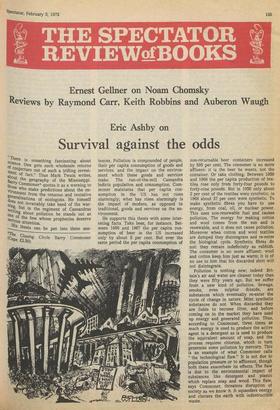Eric Ashby on
Survival against the odds
There is something fascinating about science. One gets such wholesale returns of conjecture out of such a trifling investrnenr of fact." Thus Mark Twain writes, a_ bout the geography of the Mississippi. Barry Commoner* quotes it as a warning to those who make predictions about the environment from the tenuous and tentative generalisations of ecologists. He himself do. es not invariably take heed of the warnili,g, but in the regiment of Cassandras Writing about pollution he stands out as °Ile of the few whose prophecies deserve serious attention. His thesis can be put into three sen*The tences. Pollution is compounded of people, their per capita consumption of goods and services, and the impact on the environment which these goods and services make. The run-of-the-mill Cassandra indicts population and consumption. Commoner maintains that per capita consumption in the US has not risen alarmingly; what has risen alarmingly is the impact of modern, as opposed to traditional, goods and services on the environment.
He supports this thesis with some interesting facts. Take beer, for instance. Between 1950 and 1967 the per capita consumption of beer in the US increased only by about 5 per cent. But over the same period the per capita consumption of non-returnable beer containers increased by 595 per cent. The consumer is no more affluent: it is the beer he wants, not the container. Or take clothing. Between 1950 and 1968 the per capita production of textiles rose only from forty-four pounds to forty-nine pounds. But in 1950 only about 2 per cent of the textiles were synthetic; in 1968 about 37 per cent were synthetic. To make synthetic fibres you have to use energy, from coal, oil, or nuclear power. This uses non-renewable fuel and causes pollution. The energy for making cotton and wool comes from the sun and is renewable, and it does not cause pollution. Moreover when cotton and wool textiles are dumped they disintegrate and re-enter the biological cycle. Synthetic fibres do not: they remain indefinitely as rubbish. The consumer is no more affluent: wool and cotton keep him just as warm; it is of no use to him that his discarded shirt will not disintegrate.
Pollution is nothing new; indeed Britain's air and water are cleaner today than they were fifty years ago. But we suffer from a new kind of pollution. Sewage, smoke, even sulphur dioxide, are substances which eventually re-enter the cycle of change in nature. MOst synthetic substances do not. When discarded they are liable to become litter, and before coming on to the market they have used up energy and generated pollution. Thus, according to Commoner, three times as much energy is used to produce the active agent in a detergent as is used to produce the equivalent amount of soap, and the process requires chlorine, which in turn generates some pollution by mercury. This is an example of what Commoner calls "the technological flaw." It is not due to population pressure or to affluence, though both these exacerbate its effects. The flaw is due to the environmental impact of substances like detergent and plastic which replace soap and wood. This flaw. says Commoner, threatens disruption of society as we know it. It squanders energy and clutters the earth with indestructible waste. Commoner is too good a biologist to imagine (as some Cassandras do) that ecology — the study of interrelationships among living things — is a wonderful new science revealed to conservationists in the 1960s. Anyone who has heard the Yorkshire folk song ' On Ilkley Moor baht aht ' recollects its vivid (and substantially accurate) summary of the decay and recycling of the human body. True, the verse: "Then worms will coom and eat thee up" omits the critical stage — the action of soil bacteria; but this can be forgiven in a folk song. Commoner's theme is that this omission cannot be forgiven by those who manage modern technological society. For it is just those parts of the biological cycle occupied by microscopic organisms which are most vulnerable to the secondary effects of technology. That is where irreparable harm might be done. The dilemma lies in the word might. Commoner admits this with more honesty than do most writers about the environment. Even he cannot underwrite speculation with much fact. He does cite one plausible calculation, made by the US National Academy of Sciences: that by about the year 2000 the organic wastes — sewage and the like — being poured into the surface waters of the US will have depleted these waters of oxygen. If this does happen, the capacity of these waters to purify organic waste would be destroyed, and that would indeed be a calamity. But the chain of logic in this, as in other similar predictions, is too weak to support any effective political action. Again — another example cited by Commoner — supersonic aircraft might affect dzone in the upper atmosphere and this in turn might (though here Commoner slides into writing would) cause more ultraviolet-induced skin cancer. Commoner writes about environmental problems on the North American continent, which for various reasons, (Jeffersonian state rights among them), are more severe than they are in Britain. The book edited by Edward Goldsmith is entitled Can Britain Survive?* It is a collection of essays by different authors on the limits of growth, the dangers of industrialised agriculture, diminishing resources, pollution, and the dire social consequences of these affronts to the environment. The quality of the essays is uneven and the book has none of the coherence or eloquence of Commoner's book. There are useful summaries on the state of knowledge of energy production, on the possibilities of a worldwide water shortage, on *Can Britain Survive? edited by Edward Goldsmith (Tom Stacey £3) pesticides, and on the relation between population, prices, and wages; but too many of the chapters are handouts of indiscriminate statistics without careful instructions about how to interpret them. The innuendo — that the facts and figures in the book throw doubt on whether Britain can survive — puts this book in the category of run-of-the-mill Cassandras. Even as balanced records of current facts the book does not inspire confidence, for there are some surprising omissions and some of the references to published work at the end of the chapters show a capricious choice.
But these are trivial criticisms. The weakness of the book (in striking contrast to Commoner's book) is its flimsy logic. Where Commoner occasionally slips from what might happen to what will happen, some of the authors in Can Britain Survive? seem incapable of distinguishing between these two verbs. The writer on food sets out the dangers ahead and, in his last paragraph, the way the dangers might be averted. The editor's conclusion, referring to this chapter, reads: " It is certain that" there will be widespread famine. The writer on minerals is apprehensive over future supplies but he says (quite rightly) that " reliable estimates for most minerals are not available." The editor's conclusion, referring to this chapter, reads: "By the end of the century there will be [my italics] practically no tungsten, copper, lead, zinc, tin . . . "In Britain air pollution has diminished dramatically since the introduction of the Clean Air Acts. Total smoke emissions, for example, fell from 2,31 million tons in 1953 to 0.93 million tons in 1968. But Edward Goldsmith considers this sort of improvement a waste of money, because it treats the symptoms, not the disease; indeed it renders the disease — our present life style — " correspondingly more tolerable." And, among a score of gloomy prognostications, what is the evidence for this one: "In general, there is bound to be [my italics] increasing disenchantment with modern medicine whose short term benefits will be found to compensate less and less for their biological and social side effects "?
This sort of loose thinking does a grave disservice to the cause of environmental conservation. It generates distrust, not concern, and detracts from the credibility of those who are trying to give the public accurate information about the environmental crisis.
For there is no doubt that we are living at the beginning of an environmental crisis, although we cannot predict what its effects will be. The prospect for pollution permits guarded optimism. For some products, including energy, the amount of pollution per unit of product hes, diminished; this is true, for instance, 13' methanol and ammonia. The conditions for optimism are (a) that adequate costs for pollution abatement are included in budgets for both public and private enter" prise, and (b) that there is firm legislation to ensure that these costs are met. As for population and the use of non-renewable resources, these cannot continue to groW indefinitely. The question is not whether population will reach a steady state, but, how: by war, or shortage of food ant' other resources, or disease, or voluntary consent. The question is not whether those who survive the crisis will get on without tungsten or copper or whatever, but ho'": by recycling or substitutes or just doing without. It is not helpful to respond t°, these great questions by emotion animadversions against technology. It iS helpful to face the questions in the realistic way Commoner puts them in the last four chapters of his book. "Who ", asks, "is to be the Solomon of model technology and weigh in the balance el' the good that comes of it against the ecological, social costs?" The lesser Ces' sandras try to answer this question. C051: moner rightly says that the answer inus: be reserved to history itself. But it is ne' too soon to suggest that some categories of people should not be permitted 133' society to play the part of Solomon. Here is my own list. Not economists, yet; for they wr,ite, elegant theoretical papers about balanclob the Social costs of pollution (damage t° health, laundry bills, value of property. erri joyment of amenity) against the costs 0' abating pollution; but when it comes W taching money values to the social costS' they appear (to the common-sense citizeu)t to be dangerously naive. And their COse benefit analyses (as the response to tbn Roskill Commission's report demonstrate'of are likely to be thrown by the public int the waste paper basket. Not industrialists; for they are comrrtit' ted to the profit motive and an obligatione to increase productivity, and it may b, that these commitments are inconsistell,; with the survival of western society. 1.1.1,1 is true, too, for the commitments of tee' nocratic socialists to the fulfilment ° national plans for production.
Not — please God — the more conservationists; for for their solution is tit population must decline, economic groW"e must be stopped, private transport must b abandoned for public transport. The te0),,P. ting way to achieve ends like these, erned by the word " must," is by 01, tatorship. If it's a choice between polluti°':, and a British Stalin, I choose polluti°,'' ecyheiltydretniteoo,e.ven if it chokes me; for 131' Who remains to play Solomon? people and their elected representative 5.0 Too slow? Perhaps, and if they are WI, slow civilisation, as we understand might decay. But there are grounds hope. Nine years ago, for fear of Strontie 90, the US and the USSR confirmed r1:5 Limited Nuclear Test Ban Treaty, This the first hard evidence that internat1o03„ sanity is possible. The plea in Commoner book is that it should not be the last.











































 Previous page
Previous page